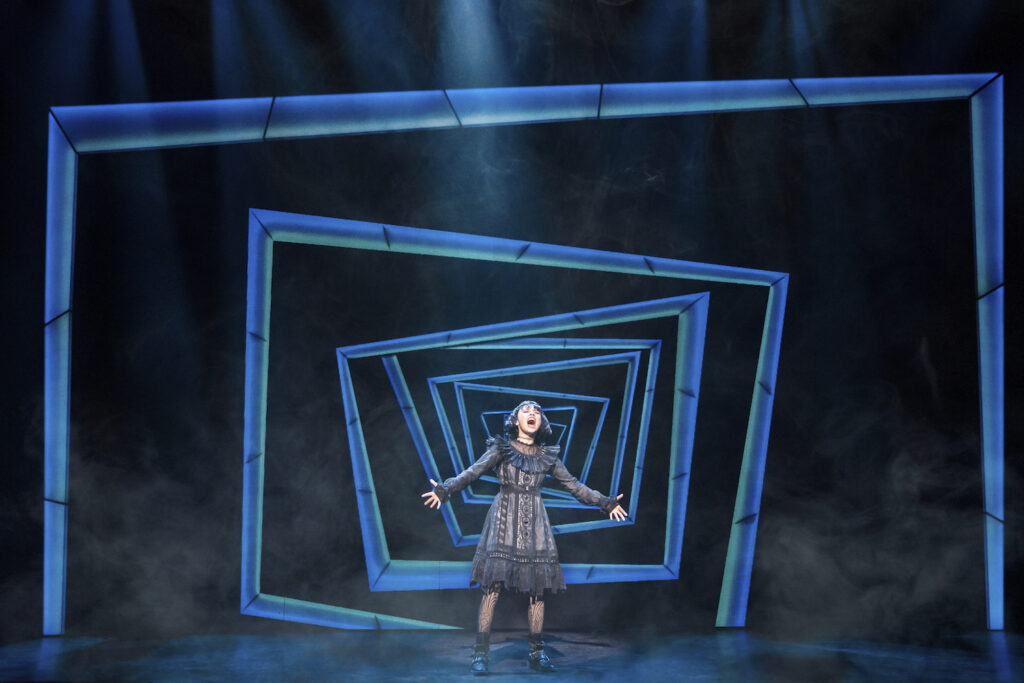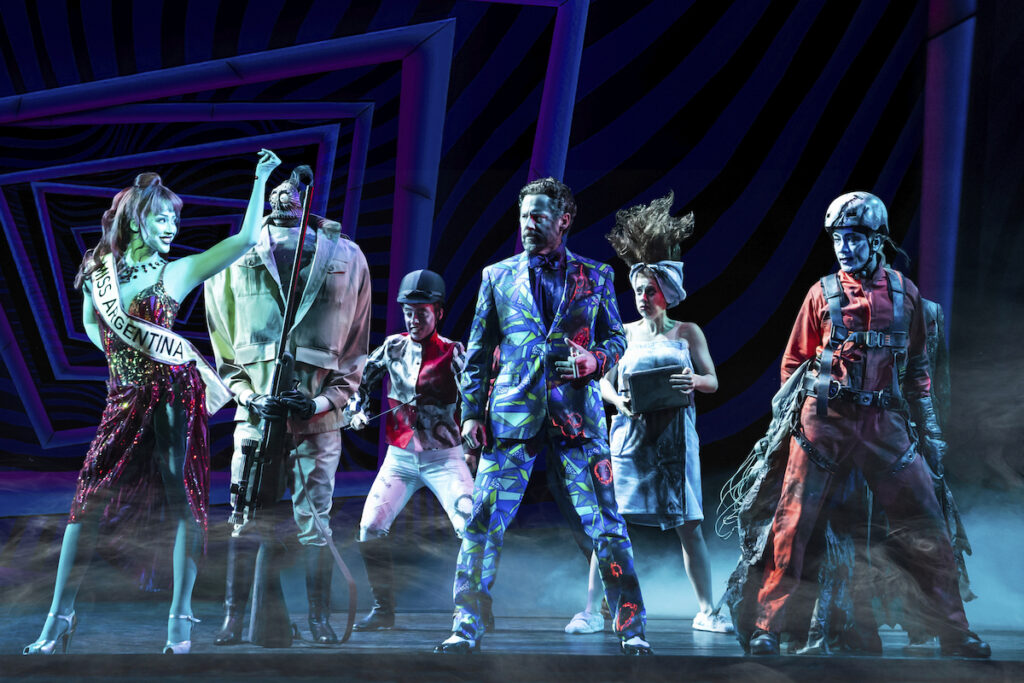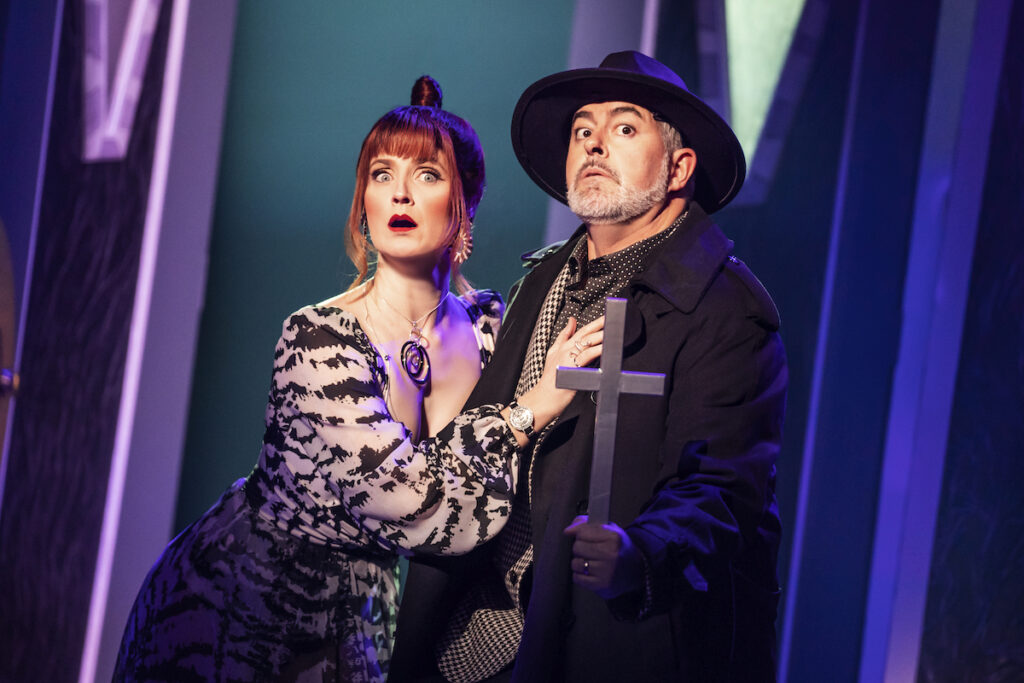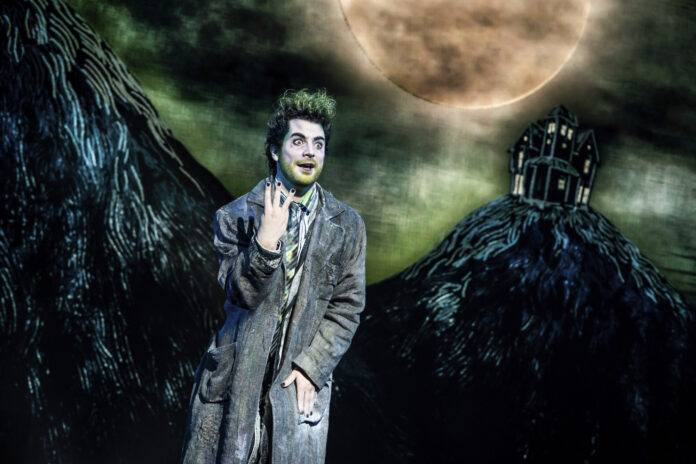“If we say Beetlejuice three times does it summon a better wig?” my friend asked upon seeing the street-poster promotion for “Beetlejuice—The Musical” (through December 29 at Golden Gate Theater), which made the undead protagonist, immortalized by a maniacal Michael Keaton in the beloved 1988 Tim Burton movie, look like just another wild ‘n crazy guy from Party City. I’m happy to inform that Beetlejuice’s look in the actual production is light-years better: Beetlejuice now resembles a pleasantly middle-aged Billy Joe Armstrong. But in filling out and updating the film’s nihilism-friendly story of ghosts and guignol with contemporary tropes of validation and trauma, “Beetlejuice” loses much of its chaotic charm.
For sure, the show is full of wicked jabs, eye-popping sights, and endless energy, thanks to an exhaustingly game ensemble cast. These things are pretty much critic-proof, and every generation should get the goth-adjacent musical bonanza it deserves—I suppose mine’s was “Rent,” sandwiched between “Phantom” and “Wicked”—even though most of the gleefully cosplaying audience was well under the age of the 33-year-old movie. The house went wild at the appearance of characters like the wrist-slit Miss Argentina and throat-smoking stentorian Juno, both with hugely expanded roles here, as well as Shrunken Head Guy, the plane-crashed football team, and other indelible figures from the film’s surreal universe.

The bare bones of the story are still here. Teenage Lydia (played by agile understudy Nevada Riley, subbing in for Isabella Esler on the night I was there) has just lost her mother, and has taken to wearing all black and acting every inch the bereaved teen, while her oblivious father Charles (Jesse Sharp) has immediately taken up with sly yet ditzy life coach Delia (the terrific Kate Marilley). For some nebulous real-estate-scheme reason, they’ve decamped to the countryside Victorian house of recently deceased yuppie couple Barbara (Britney Coleman) and Adam (Will Burton) who, now entry-level ghosts, want them out.
That’s where Beetlejuice (Justin Collette) springs into action. An outcast from the Netherworld, he pops up to show Barbara and Adam how to put some “spectacular” in their specteration, causing maximum mischief. When he discovers that Lydia can see him—either because she’s wild with grief, or a budding genius photographer, or just a cool teen, we don’t know—he sees a vital opportunity. If he can get someone living like Lydia to say his name three times, he comes back to life, with all his otherworldly powers intact. This she does, in an attempt to wreak havoc on her father’s romantic and business relationships, while possibly leading to afterlife contact with her mother. This sets in motion a series of ghoulish events that will fill the stage with mayhem, song, and lots of flashing lights.

Scott Brown and Anthony King’s script updates the film’s outlook with some hilarious jokes and the required knowingness and fourth-wall-breaking of every 21st-century comedy. “Saddled with a ballad for the opening number,” Beetlejuice acidly observes of Lydia’s funereal entrance. “What a departure from the source material.” At one point, he declares, “I’m your biggest nightmare—socially liberal but fiscal conservative.”
The gruff-voiced Collette lands these lines beautifully, and dives into Beetlejuice’s new-found queerness, although he’s now portrayed as an all-around pansexual harasser. (Let’s just not talk about the cringe-y scenes where Beetlejuice attempts to marry teenage Lydia, something even the writers don’t know what to do with.) And the cast makes a fabulous go of the cheeky songs by Eddie Perfect, as well, even if their carnivalesque bombast grows monotonous, with one “Streetcar!” big finish after another.
The real problems come when the play tries to deepen the main characters, who fervently wish to “be seen” and are working through huge mommy issues. These things are fine to include! But unfortunately they have the effect of turning the Beetlejuice character from fascinatingly impetuous Id, a loopy Loki on the loose, into a toxic, attention-draining man-baby. The kind of bad boyfriend who, if you dared look away once during their Joker-like screed against society, would sarcastically whine, ‘Oh, am I boring you?” and stomp their Doc Martens out the door with a pouty slam. Maybe I’m bringing some trauma of my own into this, lol, but I think we all know the type.

Similarly, Lydia goes from cooly oblique teen to psychological study in grief. The movie had its schmaltzy moments, but it succeeded by putting the characters’ eccentricities above any redemption arc. “Beetlejuice—The Musical,” however, dives headlong into the quest for validation and selfhood. Honestly, you couldn’t score a more on-the-nose metaphor for being seen than ghosts coming back to life, so I don’t begrudge the writers for leaning on it. But all this business deflates Burton’s wacky world with stabbing tears.
The glitzy, scaled-up sets, too, fail to conjure up the immersiveness of Burton’s vision, missing the inspired Memphis-meets-Gorey lunacy of the film’s aesthetic. The one thing that carries over the original spirit most is Kate Marrilley’s delicious performance as Delia, stepping into the daunting stilettos of the legendary Catherine O’Hara. Her zesty portrayal of the duplicitous, guru-quoting, statuesque schemer is what will keep this production from disappearing into the Netherworld of Forgotten Shows.
BEETLEJUICE—THE MUSICAL runs through December 31 at Golden Gate Theater, SF. More info here.







